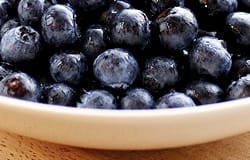| In an article published online on January 4, 2010 in the Journal of Agricultural and Food Chemistry, Robert Krikorian of the University of Cincinnati, along with his colleagues from the US and Canadian Departments of Agriculture, report that consuming blueberry juice was associated with improvements in learning and memory in individuals with age-related memory decline. The trial enrolled five men and four women over the age of 70 who reported forgetfulness and memory lapses characteristic of early memory decline. Participants were given the equivalent of 2 to 2 ½ cups of a commercially available blueberry juice daily for 12 weeks. Cognitive assessments were conducted at the beginning of the study and during the final week of the trial. At the study's conclusion, learning and recall were improved, and depressive symptoms and glucose levels tended to be reduced. When subjects who received blueberry juice were compared with a demographically matched sample who received a placebo beverage in a companion trial, test scores for learning ability were significantly better. Enhanced signaling and neuroprotection have been demonstrated in association with blueberry supplementation in animal studies, and phenolic compounds known as anthocyanins that occur in blueberries have been found in regions of the brain that are essential for cognitive function. Anthocyanins have insulin-like properties that improve metabolic function, which, when disturbed, appears to be a factor in neurodegeneration as well as cardiovascular diseases. "To our knowledge, this is the first human trial assessing the potential benefit of blueberry supplementation on neurocognitive function in older adults with increased risk for dementia," the authors announce. "Although the sample size was relatively small, effect sizes were moderate to large for both the primary and secondary analyses." "These preliminary memory findings are encouraging and suggest that consistent supplementation with blueberries may offer an approach to forestall or mitigate neurodegeneration," they conclude. "This initial study establishes a basis for further human research of blueberry supplementation as a preventive intervention with respect to cognitive aging." | 














